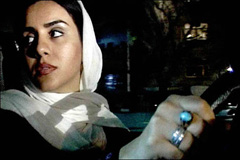Ten (Abbas Kiarostami) 2002
 Ten,
Abbas Kiarostamiís new movie, only puts forth the appearance of
effortlessness. Essentially using just static two camera setups the digitally
filmed motion picture, which is entirely car bound, alternates between showing a
female driver and various passengers as they converse with each other and
enlighten us about womenís rights in Iran. Credit must go to the director for
never turning the talky movie into a shot / reverse shot tennis match as the
actors prattle on. Thereís not a cut at all for the first twenty minutes or so
of action as the director intently focuses on one participant in an argument
between a mother and son. They discuss the recent marriage of the mother to a
man other than the boyís father, who she divorced. Through the surprisingly
naturalistic conversation, the audience comes to learn a bit about the
complexities of Iranian gender politics, but Kiarostami surprisingly doesnít
attempt to turn his female protagonist into some kind of martyr for womenís
rights. Itís revealed that she lied, telling the judge that her husband was a
drug addict, to gain her divorce, and sheís completely unrepentant about it.
If her actions arenít wholly sympathetic, theyíre certainly understandable
given the situation. That the audience understands her plight after spending
only a few moments with her is a testament to the concise nature of this
seemingly random amalgamation of scenes.
Ten,
Abbas Kiarostamiís new movie, only puts forth the appearance of
effortlessness. Essentially using just static two camera setups the digitally
filmed motion picture, which is entirely car bound, alternates between showing a
female driver and various passengers as they converse with each other and
enlighten us about womenís rights in Iran. Credit must go to the director for
never turning the talky movie into a shot / reverse shot tennis match as the
actors prattle on. Thereís not a cut at all for the first twenty minutes or so
of action as the director intently focuses on one participant in an argument
between a mother and son. They discuss the recent marriage of the mother to a
man other than the boyís father, who she divorced. Through the surprisingly
naturalistic conversation, the audience comes to learn a bit about the
complexities of Iranian gender politics, but Kiarostami surprisingly doesnít
attempt to turn his female protagonist into some kind of martyr for womenís
rights. Itís revealed that she lied, telling the judge that her husband was a
drug addict, to gain her divorce, and sheís completely unrepentant about it.
If her actions arenít wholly sympathetic, theyíre certainly understandable
given the situation. That the audience understands her plight after spending
only a few moments with her is a testament to the concise nature of this
seemingly random amalgamation of scenes.
 The greatest disappointments in Ten donít come
from Kiarostamiís inability to really open up the drama and make it feel more
universal than it does. Since the intimate focus achieved early on is remains
relatively immediate and lively for the duration of the picture, one should
scarcely care that the movie isnít bigger in scope (indeed, a casual remark
from the protagonist about womenís physical self-image issues feels unwelcome
precisely because it feels so calculated to appeal to Western audiences). What
does hurt the experimentís success, however, is the directorís lack of
explicit justification for setting all of his action in a car. Other Kiarostami
films, which tend to be car bound as well, have done a better job of showing us
why it is that they take place in automobiles. Plenty of ideas pop into my head
on this point. Is it so we can see that the liberated, divorced protagonist is
always in the driverís seat? Is it so we can understand that her journey is
never complete? Is it to show the existence of an intensely private space in the
public thatís both suitable for intimate revelations and public debate? Is it
so the director can take the audienceís focus off of setting (which is
ever-changing here) and place it wholly on character? All of these theses seem
valid to a degree, but none of them seem wholly satisfactory.
The greatest disappointments in Ten donít come
from Kiarostamiís inability to really open up the drama and make it feel more
universal than it does. Since the intimate focus achieved early on is remains
relatively immediate and lively for the duration of the picture, one should
scarcely care that the movie isnít bigger in scope (indeed, a casual remark
from the protagonist about womenís physical self-image issues feels unwelcome
precisely because it feels so calculated to appeal to Western audiences). What
does hurt the experimentís success, however, is the directorís lack of
explicit justification for setting all of his action in a car. Other Kiarostami
films, which tend to be car bound as well, have done a better job of showing us
why it is that they take place in automobiles. Plenty of ideas pop into my head
on this point. Is it so we can see that the liberated, divorced protagonist is
always in the driverís seat? Is it so we can understand that her journey is
never complete? Is it to show the existence of an intensely private space in the
public thatís both suitable for intimate revelations and public debate? Is it
so the director can take the audienceís focus off of setting (which is
ever-changing here) and place it wholly on character? All of these theses seem
valid to a degree, but none of them seem wholly satisfactory.
 The achievements of Ten are considerable enough to
outweigh even such a major quibble as that, however. Kiarostamiís use of
off-screen space to enhance the world his films take place in is as adroit as
ever here. Although this movie sometimes seems randomly put together, thereís a fair
amount of craft on display. Kiarostami uses jump cuts to compress what still
feels like real time. He also composes shots more than one would expect
considering the static camera set-ups and shows us characters glimpsed and
locations that are only glimpsed through the frame of the carís windows. The
quality of the acting is uniformly stellar. Itís nearly impossible for a
casual viewer to guess the amount of training that the actors have had, since
they all deliver their performances in the same convincingly unmannered manner.
If Ten feels neither like a reinvention of cinema nor a truly
fundamentalist attempt to get back to basics, it manages to work best as a
distinctive entry in Kiarostamiís diverse oeuvre. Fans of the director will find
more to like in it than casual samplers, I imagine, but even those wholly
unacquainted with his work should find it hard to deny the emotional pull that
such proximity to characters creates.
The achievements of Ten are considerable enough to
outweigh even such a major quibble as that, however. Kiarostamiís use of
off-screen space to enhance the world his films take place in is as adroit as
ever here. Although this movie sometimes seems randomly put together, thereís a fair
amount of craft on display. Kiarostami uses jump cuts to compress what still
feels like real time. He also composes shots more than one would expect
considering the static camera set-ups and shows us characters glimpsed and
locations that are only glimpsed through the frame of the carís windows. The
quality of the acting is uniformly stellar. Itís nearly impossible for a
casual viewer to guess the amount of training that the actors have had, since
they all deliver their performances in the same convincingly unmannered manner.
If Ten feels neither like a reinvention of cinema nor a truly
fundamentalist attempt to get back to basics, it manages to work best as a
distinctive entry in Kiarostamiís diverse oeuvre. Fans of the director will find
more to like in it than casual samplers, I imagine, but even those wholly
unacquainted with his work should find it hard to deny the emotional pull that
such proximity to characters creates.
* * *
10-08-02
Jeremy Heilman